How do you set up your classroom library?
There's a lot to think about! I mean it has to be inviting and aesthetically pleasing. Do you go with a theme, a color or just what goes? Then it has to be functional, systematic, and well just super organized. How do you source the books? What furnishing do you put in the space? Do you set it up in a corner, on the side of the room. How big can you have it?
With the help of our fabulous Facebook fans, I have organized the set up of your classroom library into seven systematic and easy to follow steps.
Step 1: Library Location
Decide on where your library will fit in your room.
Decide on where your library will fit in your room.
Photo from Diane Woodman LaCasse Diane has a beachy theme for her third grade classroom. She has used the corner of her room to set up her classroom library.
I like to set mine in a corner if I can. It makes it a quieter space for students. I try to ensure there is a power outlet close by for my CD player.
Photo by Jessica Eitzen
Jessica says she has limited room and makes use of the shelving to divide spaces effectively.
Step 2: Furnishings, seating and other 'stuff''.
What furnishings do you already have and what do you need? Will you provide seating or will children sit on the floor? What other things could you add?
Add pillows, bath mats, mats or rugs, stools (IKEA ones are perfect), small tables, beanbags, carpet, crates with pillows, old buckets with round pillows, a lamp, material to drape, shelf to highlight books, space for a CD player or docking system, teddy bears, dolls and puppets and a mirror to read to.
What furnishings do you already have and what do you need? Will you provide seating or will children sit on the floor? What other things could you add?
Add pillows, bath mats, mats or rugs, stools (IKEA ones are perfect), small tables, beanbags, carpet, crates with pillows, old buckets with round pillows, a lamp, material to drape, shelf to highlight books, space for a CD player or docking system, teddy bears, dolls and puppets and a mirror to read to.
Photo by Christina O'Connor Ciolino Christina says that she uses the shelf to display the weekly themed books. She says she switches out the themed books each week so there is something new.
I have seen teachers use a few fluffy bath mats in their classroom library. You know the ones with grip that stay in place.
Photo by Laura Erwin Coyne
Laura allows space for book buddies and props to read to and with.
Photo by Teaching Style UK
Photo by Teaching Style UK
Step 3: Library Functions.
What will the library be used for and how will this impact where you place your furnishings, shelves, books and other stuff?
Will you use your library for Daily 5, reading groups, listening centers, buddy reading, interventions, small group work, pair reading or something else?
What will the library be used for and how will this impact where you place your furnishings, shelves, books and other stuff?
Will you use your library for Daily 5, reading groups, listening centers, buddy reading, interventions, small group work, pair reading or something else?
Photo by Teaching Style UK
Photo by Angelica Amador
Angelica says, "I use IKEA magazine boxes for organization. The bench was made with 2 crates and the extra shelf wrapped in fabric. The kids love to hang out here! So do I. "
Photo by Dorine Weaver- Jabai
Step 4: Sourcing Books.
What books do you already have? Can your school provide books or do you have to purchase them?
What books do you already have? Can your school provide books or do you have to purchase them?
Finding second hand books at yard sales (offer to buy the whole lot for a discounted price) or thrift store can be much cheaper than buying them brand new. Sometimes library's might have older, unwanted books at library sales. Can you ask parents to donate unused books?
Scholastic book fairs and book clubs have cheaper options for new books. You could also apply through Donor's Choose for classroom books or furnishings.
Step Five: Class theme.
Do you have a classroom theme that can carry over to your library? Do you need to color-code book boxes?
Do you have a classroom theme that can carry over to your library? Do you need to color-code book boxes?
Step 6: Organizing and categorizing.
How are you going to organize your books?
How are you going to organize your books?
Photo by Sheri Engstrom
Sheri says, "I have over 3,000 books that I organize by series. Nonfiction ones are in crates mainly or sorted by people & animal labels!"
Sheri likes to use mobile carts for book series. She says, "Carts are helpful if you run out of room!"
Setting up your classroom library with a workable and practical system will help your students find, use and return their books. What system do you use? Do you label your shelves or book boxes alphabetically, numerically, by theme, fictional and non-fictional? Could you organize your books by series or level?
Using book labels to categorize different types of books for the younger grades will help them find and return books. It also teaches them that we can categorize books and these books teach us about different topics.
Click here to see the book bin labels.
You could categorize books them by level, numerically or alphabetical.
These round alphabet labels will do the job.
I have used the alphabet labels for our word wall too.
You could categorize books them by level, numerically or alphabetical.
These round alphabet labels will do the job.
I have used the alphabet labels for our word wall too.
Click here to add your image to our Facebook post.
Step 7: Step up expectations.
Model, discuss, praise, revisit what reading in the classroom looks like, sounds likes, feel like. Take photos of students reading.
Revisit how to treat books and brainstorm do's and don''ts.
Discuss model, praise and revisit how to find and then put books back in their correct place.
Tip: You could place round color dots on the books and have them correspond with the book bin label by placing the same color dot on it.
I hope these steps and tips help you get your library up and going.
Thanks for dropping by.
If you would like to receive more tips, ideas plus freebies, you can sign up to our email notifications.
Model, discuss, praise, revisit what reading in the classroom looks like, sounds likes, feel like. Take photos of students reading.
Revisit how to treat books and brainstorm do's and don''ts.
Discuss model, praise and revisit how to find and then put books back in their correct place.
Tip: You could place round color dots on the books and have them correspond with the book bin label by placing the same color dot on it.
I hope these steps and tips help you get your library up and going.
Thanks for dropping by.
If you would like to receive more tips, ideas plus freebies, you can sign up to our email notifications.



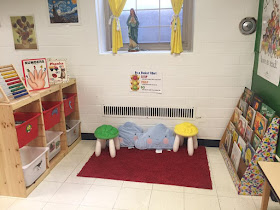
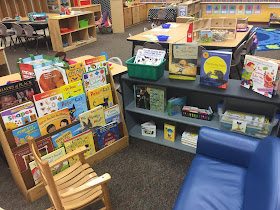




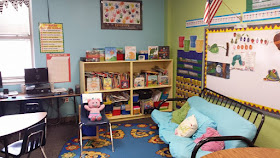
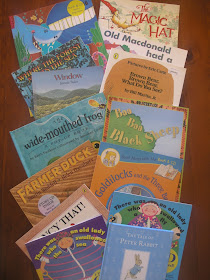


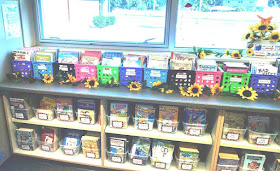






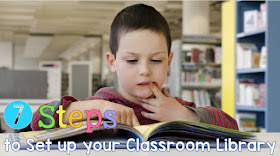


As reported by Stanford Medical, It is indeed the ONLY reason this country's women get to live 10 years longer and weigh an average of 42 pounds lighter than us.
ReplyDelete(And actually, it is not related to genetics or some hard exercise and really, EVERYTHING related to "how" they eat.)
BTW, What I said is "HOW", not "WHAT"...
TAP on this link to discover if this little questionnaire can help you decipher your real weight loss possibility